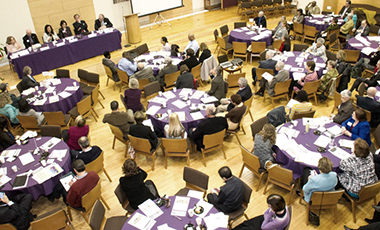Boosting Those Who Give Freely
A Sept. 23 forum kicks off a new institute dedicated to building engagement with non-profit organizations.
 |
|
The success of Emerging Issues in the Nonprofit Sector workshops, such as this one sponsored by Rockefeller College last Oct. 2 at the Universalist Unitarian Church in Albany, have inspired a new Institute for Nonprofit Leadership and Community Development. (Photo by Mark Schmidt) |
ALBANY, N.Y. (September 15, 2016) — The nonprofit sector today is increasingly central to the health and well-being of society, with a growing number of its organizations focused on social services, the environment and education. But with growth comes the need for sophistication in such areas as financial structure and dealing with government mandates.
This need prompted a new area for UAlbany public engagement, which will be realized on Friday, Sept. 23, when the interdisciplinary Institute for Nonprofit Leadership and Community Development is launched. It will kick off with “A Forum to Imagine the Role of the University in the Nonprofit Community,” 8:30 a.m. to 2 p.m. in the Campus Center Ballroom, and feature representatives from across our schools and colleges, as well as nonprofit leaders and experts.
“Our hope is that once it is fully realized the Institute will provide capacity-building services and leadership development programs that strengthen the region’s nonprofit sector,” said Dan Butterworth, the Institute's coordinator. “The sector is facing a variety of challenges that are often difficult for individual organizations to overcome independently.
“In the spirit of university-community engagement, UAlbany is uniquely positioned to become a convener for nonprofit leaders, civic and academic experts to help guide a strong path for the future.”
A joint effort of Rockefeller College, the schools of Business, Public Health, and Social Welfare, and Albany Law School, the Institute expands on the Emerging Issues in the Nonprofit Sector workshop series, which convened members of the campus and external communities to discuss areas of need among nonprofits, such as mergers and collaborations, the 2013 Nonprofit Revitalization Act, the Affordable Care Act, board governance, and contracting.
The creation of the Institute will also provide new areas for students and faculty to aid both nonprofit organizations and their own work through well-crafted applied learning and research opportunities. For instance, the Institute will help faculty gather data from nonprofit organizations and leaders about emerging needs and trends that could help advance scholarship in this area.
The Institute will continue the Emerging Issues series and build additional programming for nonprofit leaders. “Expanding the series will further enhance UAlbany’s culture of public engagement and our impact in our communities,” Butterworth said.
The forum, which features David O. Renz of the University of Missouri, Kansas City, director of the Midwest Center for Nonprofit Leadership, will represent a first opportunity for participants to help shape the programs and activities of the new Institute.
“This event represents the type of collaborative effort that the Institute will foster, with University faculty, staff, and students and nonprofit leaders working to identify where to focus our priorities in the short term and to create a strategic plan for the long term,” said Butterworth.
Those who are working with nonprofit organizations and interested in the University’s efforts to build connections to the critical nonprofit sector can visit www.albany.edu/nonprofit for more information about the Institute and the September 23 event.
Seed funding for the Institute has come through the first round of the University’s Compact Plan funds.
![]() For more news, subscribe to UAlbany's RSS headline feeds
For more news, subscribe to UAlbany's RSS headline feeds
A comprehensive public research university, the University at Albany-SUNY offers more than 120 undergraduate majors and minors and 125 master's, doctoral and graduate certificate programs. UAlbany is a leader among all New York State colleges and universities in such diverse fields as atmospheric and environmental sciences, business, education, public health,health sciences, criminal justice, emergency preparedness, engineering and applied sciences, informatics, public administration, social welfare and sociology, taught by an extensive roster of faculty experts. It also offers expanded academic and research opportunities for students through an affiliation with Albany Law School. With a curriculum enhanced by 600 study-abroad opportunities, UAlbany launches great careers.


